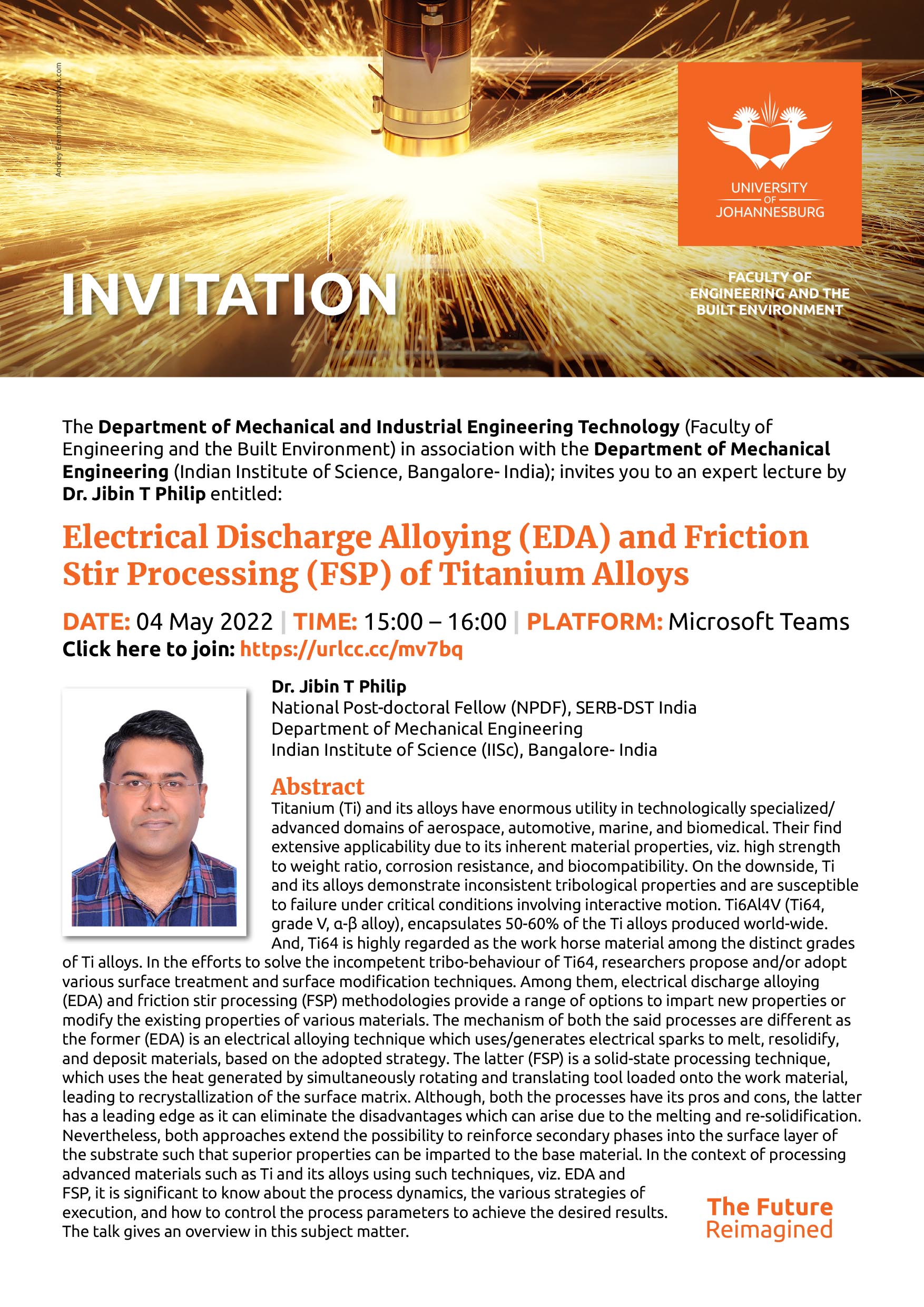Electrical Discharge Alloying (EDA) and Friction Stir Processing (FSP) of Titanium Alloys
The Department of Mechanical and Industrial Engineering Technology (Faculty of Engineering and the Built Environment) in association with the Department of Mechanical Engineering (Indian Institute of Science, Bangalore- India); invites you to an expert lecture by Dr. Jibin T Philip entitled: Electrical Discharge Alloying (EDA) and Friction Stir Processing (FSP) of Titanium Alloys
DATE: 04 May 2022 |
TIME: 15:00 – 16:00 |
PLATFORM: Micro soft Teams
Click here to join: https://urlcc.cc/mv7bq
Dr. Jibin T Philip
National Post-doctoral Fellow (NPDF), SERB-DST India Department of Mechanical Engineering Indian Institute of Science (IISc), Bangalore- India
Abstract
Titanium (Ti) and its alloys have enormous utility in technologically specialized/ advanced domains of aerospace, automotive, marine, and biomedical. Their find
extensive applicability due to its inherent material properties, viz. high strength to weight ratio, corrosion resistance, and biocompatibility. On the downside, Ti
and its alloys demonstrate inconsistent tribological properties and are susceptible to failure under critical conditions involving interactive motion. Ti6Al4V (Ti64,
grade V, α-β alloy), encapsulates 50-60% of the Ti alloys produced world-wide. And, Ti64 is highly regarded as the work horse material among the distinct grades of Ti alloys. In the efforts to solve the incompetent tribo-behaviour of Ti64, researchers propose and/or adopt various surface treatment and surface modification techniques. Among them, electrical discharge alloying (EDA) and friction stir processing (FSP) methodologies provide a range of options to impart new properties or
modify the existing properties of various materials. The mechanism of both the said processes are different as the former (EDA) is an electrical alloying technique which uses/generates electrical sparks to melt, resolidify, and deposit materials, based on the adopted strategy. The latter (FSP) is a solid-state processing technique,
which uses the heat generated by simultaneously rotating and translating tool loaded onto the work material, leading to recrystallization of the surface matrix. Although, both the processes have its pros and cons, the latter has a leading edge as it can eliminate the disadvantages which can arise due to the melting and re-solidification. Nevertheless, both approaches extend the possibility to reinforce secondary phases into the surface layer of the substrate such that superior properties can be imparted to the base material. In the context of processing advanced materials such as Ti and its alloys using such techniques, viz. EDA and FSP, it is significant to know about the process dynamics, the various strategies of execution, and how to control the process parameters to achieve the desired results. The talk gives an overview in this subject matter
Disclaimer: The University of Johannesburg encourages academic debate and discussion that are conducted in a manner that upholds respectful interaction, safety of all involved, and freedom of association as enshrined in the law, the Constitution, and within the boundaries of the University policies. The views expressed during events are expressed in a personal capacity and do not necessarily reflect the views of the University of Johannesburg.

